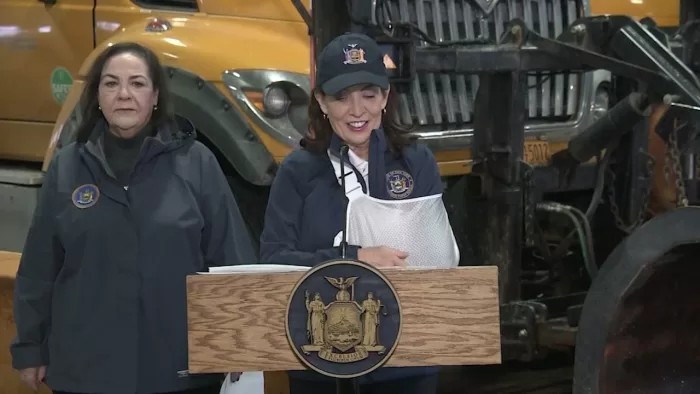Governor Hochul has directed a comprehensive operational overhaul of the Office of Cannabis Management in New York State, following a 30-day assessment identifying structural limitations hindering the agency’s ability to establish a functional cannabis marketplace. Immediate actions include reforming licensing processes, increasing enforcement against illegal storefronts, and establishing a $5 million grant program to support licensees, with further initiatives like the Cannabis Enforcement Task Force set to launch soon.
———–
Governor Kathy Hochul .. directed an operational overhaul of the Office of Cannabis Management. The overhaul follows the release of a 30-day assessment conducted by a team of individuals under the leadership of the Commissioner of the Office of General Services Jeanette Moy, that identified significant structural limitations to the Office of Cannabis Management that have affected the agency’s ability to fulfill its mandate to efficiently establish New York State’s cannabis marketplace. The assessment makes comprehensive recommendations to end the bottleneck of license applicants and improve communication with applicants and licensees – transforming the Office’s capacity to expand safe, legal cannabis operations across the state. Based on the assessment’s findings, Governor Hochul announced a series of immediate actions to reform the licensing processes and increase enforcement against illegal storefronts. The Governor also announced the establishment of a $5 million grant program to help CAURD licensees and previewed next week’s launch of the Cannabis Enforcement Task Force.
“We promised to build the strongest, most equitable legal cannabis market in the nation, and we’re announcing long-needed steps to make New York’s cannabis program work as promised,” Governor Hochul said. “I would like to thank Commissioner Jeanette Moy and her team for their hard work and thoughtful assessment, and I look forward to working with OCM to implement the report’s recommendations and transform New York’s cannabis industry.”
The assessment identified significant impediments to the Office’s effective processing and approval of applicant licensure. Without best capability to fulfill the licensing role, the individuals this process is designed to help are exhausting substantial resources navigating it and risk being left behind. Delays in the legal marketplace have created a vacuum for illegal storefronts to proliferate and squeeze out CAURD licensees. The reforms announced today will create additional capacity for closing illegal storefronts and lifting up legal operators.
New York State Office of General Services Commissioner Jeanette Moy said, “The multi-agency task force created to assess the Office of Cannabis Management has identified several steps the agency can take to unclog the bottleneck of applications by improving communication with applicants and streamlining the application process. The proposals outlined in the task force’s report will improve transparency and open lines of communication in the application process while boosting the state’s efforts to meet Governor Hochul’s commitment to equity in New York’s cannabis market.”
New York State Police Superintendent Steven G. James said, “The trafficking of illegal Cannabis is supplying the illicit shops that have cropped up across the state, disrupting the regulated market and leading other issues. The State Police will work with its partners to target those who are bringing illegal Cannabis into New York, disrupt their operation and hold them accountable to the full extent of the law.”
We promised to build the strongest, most equitable legal cannabis market in the nation, and we’re announcing long-needed steps to make New York’s cannabis program work as promised.”
Governor Hochul
Implementing Recommendations and Adopting a New Licensing Strategy
Governor Hochul announced a series of immediate actions to begin the overhaul of OCM, address illegal cannabis enforcement and put New York’s cannabis industry on the path to success. The actions include:
- Launching an enforcement task force to close illegal cannabis retail stores.
- Fixing the internal licensing process and clearing the backlog for retail establishments who were required to apply with site control.
- Committing to putting in place an SLA (service-level agreement) to allow for completion of retail license applications within 90 days for future application windows.
- Creating new communications tools, including regulatory bulletins and public dashboards to improve customer service.
- Launching OCM cannabis map to improve the transparency surrounding licensed retail locations in summer 2024.
- Adding staff to licensing, compliance and enforcement teams.
- Strengthening agency foundations and management including hiring senior positions for customer service, internal controls and audit and operations.
- Creating a 5-year strategic plan for the Office.
Providing Additional Capital to Justice-Involved Licensees
The state will establish a new program to provide financial support to CAURD licensees who have secured their own retail locations. In recognition of the delays CAURD applicants faced on the road to opening their businesses, including those due to private litigation that substantially paused the CAURD program until December 2023, Empire State Development, working in close collaboration with staff from OCM, will make a $5 million pool of funding available to eligible CAURD licensees in the form of micro-grants.
This one-time commitment of funding, which will come with no expectation of repayment if used for eligible purposes, will enable eligible CAURD licensees who have a license and have secured a location to receive a one-time grant to reimburse certain eligible initial costs that they have incurred.
In the coming months, ESD will procure an administrator for the program. With this step, the state will further one of the central goals of New York’s cannabis program: ensuring the participation in this new industry of individuals who have been disproportionately impacted by cannabis prohibition.
Additional information on the program will be shared with licensees by OCM as it becomes available.
Launching the Cannabis Enforcement Task Force
Governor Hochul also announced that the Cannabis Enforcement Task Force will be launching next week. The Task Force, led by the State Police First Deputy Superintendent, is a major statewide effort to coordinate staff from several agencies to combat the illicit cannabis market. Through collaboration between the State Police, OCM, local law enforcement and other state agencies, the task force will be well equipped to tackle the full scope of illegal cannabis activity. OCM will also lead a robust civil enforcement effort with more than 150 inspectors from OCM, the Department of Taxation and Finance, and other State agencies dedicated to padlocking as many illicit cannabis stores as possible over the next 90 days. All illicit stores throughout the state can expect to be inspected and padlocked if they’re found to be an imminent threat to health and safety.
The Task Force will be deploying teams of investigators and analysts throughout the state in established operations to make sure each illicit cannabis shop is inspected and closed. State Police will lead the criminal enforcement effort targeting cannabis trafficking and the large-scale criminal enterprise surrounding the merchandise found in these illicit shops. Through the use of resources such as the Troop Violent Gang and Narcotics Enforcement Units, State Police will conduct operations to catch and prosecute the bad actors. The Task Force will also work with landlords to help evict illegal dispensaries, and work to penalize landlords who fail to take steps to evict tenants after they are informed they are operating illegally.
These reforms will only be successful with strong enforcement mechanisms and an aggressive effort to shut down the illegal marketplace.
May 10 2024 Albany NY
——
Criticism: While NY Governor Hochul’s initiative to overhaul the Office of Cannabis Management ostensibly aims to regulate and legitimize the cannabis market, it appears to prioritize revenue generation over genuine public welfare. By imposing stringent licensing requirements and enforcement measures, the state risks inflating the cost of cannabis products for consumers, effectively pricing out small entrepreneurs and perpetuating the dominance of illicit dealers. Moreover, diverting law enforcement resources towards cracking down on unlicensed businesses detracts from efforts to combat real criminal activity, prioritizing bureaucratic red tape over tackling serious public safety concerns. This approach not only undermines the purported goal of creating a fair and equitable cannabis industry but also perpetuates the cycle of prohibition-era tactics that ultimately harm both consumers and legitimate businesses.
Marijuana use can have several dangerous health effects:
- Smoking marijuana damages the lungs and can lead to chronic bronchitis and lung infections, especially in people with weakened immune systems[1][3][5]. Marijuana smoke contains many of the same toxins and carcinogens as tobacco smoke, although it may be less carcinogenic[3][5].
- Heavy marijuana use seems to increase the risk of clogged arteries, heart failure, and may impact male fertility[2]. Marijuana can also cross the placenta during pregnancy and has been linked to low birth weights, neonatal intensive care admissions, and stillbirths[2].
- Marijuana use, especially in adolescents, can exacerbate or trigger mental health issues like schizophrenia, psychosis, and depression[2][4]. It may also affect behavior and academic performance in teens[2].
- Marijuana can be addictive, especially in vulnerable populations like adolescents with conduct disorder[1]. Marijuana dependence tends to occur only in a subpopulation of users[1].
- Edible marijuana products pose a risk of accidental ingestion and poisoning in children[3][4]. Marijuana plants can also hyperaccumulate toxic metals like lead which can enter users’ bloodstreams[2].
While marijuana is not completely benign, its adverse effects resemble many approved medications[1]. However, smoking marijuana is unlikely to prove a safe delivery method for any chronic condition due to the lung damage it causes[1]. More research is still needed on marijuana’s health effects, especially with the increasing potency of THC in recent years[4][5].
Citations:
[1] https://www.ncbi.nlm.nih.gov/books/NBK224396/
[2] https://www.scientificamerican.com/article/is-marijuana-bad-for-health-heres-what-we-know-so-far/
[3] https://www.lung.org/quit-smoking/smoking-facts/health-effects/marijuana-and-lung-health
[4] https://www.cdc.gov/marijuana/health-effects/index.html
[5] https://nida.nih.gov/publications/drugfacts/cannabis-marijuana
Sources: Midtown Tribune News – https://www.governor.ny.gov/news/governor-hochul-directs-operational-overhaul-office-cannabis-management
Big New York news BigNY.com














